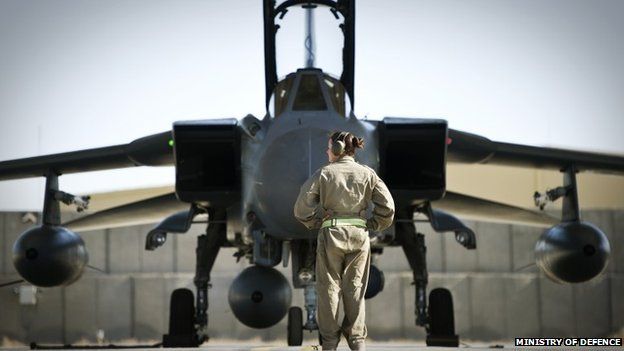US defence secretary warns against UK armed forces cuts
- Published

Cuts are being made to all of the UK's armed forces, including the RAF
The US defence secretary says he fears the UK could become "disengaged" if it makes further cuts to defence spending.
Ashton Carter told the BBC Britain had "always punched above its weight" and "it would be a great loss to the world if it now took action that would indicate disengagement".
The UK government said it was committed to meeting Nato's target of spending 2% of GDP on defence this financial year.
But it says future budgets will be determined in the next spending review.
Few countries have met the Nato target and at a summit in Wales last September, the commitment was watered down, with the less ambitious goal that those countries that were not meeting the target would "halt any decline in defence expenditure", external.
Those countries already spending 2% were encouraged to stick to that commitment and David Cameron made a speech urging other European members of the military alliance to boost spending, external.
'Engaged United Kingdom'
The British Army is already undergoing a 20% reduction in regular troop numbers
Mr Carter said: "Britain has always had an independent ability to express itself and basically punch above its weight.
"I'd hate to see that go away because I think it's a great loss to the world when a country of that much history and standing… takes actions which seem to indicate disengagement.
"We need an engaged United Kingdom."
Mr Carter's comments follow similar remarks earlier this year by the head of the US Army, General Raymond Odierno, who warned further cuts could see British units operating within US ranks, rather than divisions working alongside each other.
MPs and UK military commanders - former and serving - have also said Britain's security ability would be threatened by more cuts.
New threats
Julian Lewis, Conservative MP for New Forest East, told BBC Radio 4's The World at One that 2% spending on defence "is not a target, it's a minimum" and any possibility that level may drop was "frankly staggering".
"The international situation is darkening and what we must avoid at all costs is having to spend the money later when a crisis has arisen, when by spending it now we might help deter people from provoking such crisis," he said.
The cross-party Defence Select Committee also argued recently that the rise of Islamic State and the increase in Russian aggression meant Britain's 2010 defence plans "no longer reflect the new threats to peace around the world".
Defence Secretary Michael Fallon said the UK was committed to meeting the 2% target in the current financial year and insisted he was "confident" the government would continue to provide the armed forces with the resources they need.
He said: "We will always go on looking for ways to make defence more efficient, to ensure that more of the money is spent on the front line, just as we've done over each of the last five years.
"It's quite proper for the chancellor to ask departments to be more efficient. We will do that."
The British Army is already undergoing a 20% reduction in regular troop numbers, from 102,000 in 2010 to 82,000 in 2020.
This is to be accompanied by a rise in the number of reservists, from 24,000 to 30,000.
The Royal Navy and the RAF are both preparing to lose 5,000 regulars and gain 500 reservists over the same period.
- Published26 February 2015
- Published24 February 2014
- Published27 March 2014
- Published1 June 2015